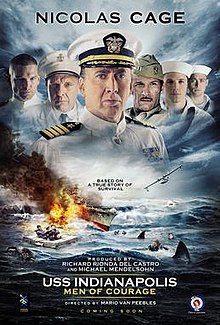USS Indianapolis: Men of Courage
| USS Indianapolis: Men of Courage | |
|---|---|

Official poster
|
|
| Directed by | Mario Van Peebles |
| Produced by | Michael Mendelsohn Richard Rionda Del Castro |
| Written by | Cam Cannon Richard Rionda Del Castro |
| Starring |
Nicolas Cage Tom Sizemore Thomas Jane James Remar Matt Lanter Brian Presley Cody Walker |
| Music by | Laurent Eyquem |
| Cinematography | Andrzej Sekuła |
| Edited by | Robert A. Ferretti |
|
Production
companies |
USS Indianapolis Production
Hannibal Classics |
| Distributed by | Saban Films |
|
Release date
|
|
|
Running time
|
128 minutes |
| Country | United States |
| Language | English |
| Budget | $40 million |
| Box office | $739,696 |
USS Indianapolis: Men of Courage (also titled USS Indianapolis: Disaster in the Philippine Sea) is an American war film directed by Mario Van Peebles and written by Cam Cannon and Richard Rionda Del Castro. The film stars Nicolas Cage, Tom Sizemore, Thomas Jane, Matt Lanter, Brian Presley, and Cody Walker. Principal photography began on June 19, 2015 in Mobile, Alabama. The film premiered in the Philippines on August 24, 2016. It was released as a digital rental on iTunes and Amazon in the United States on October 14, 2016 and in limited theaters during the Veterans Day weekend.
In 1945, the Portland-class heavy cruiser USS Indianapolis, commanded by Captain Charles McVay (Nicolas Cage), delivers parts of the atomic bomb that would later be used to level Hiroshima during the ending of World War II. While patrolling in the Philippine Sea, on July 30 in 1945, the ship is torpedoed and sunk by the Imperial Japanese Navy (IJN) submarine I-58, taking 300 crewmen with it to the bottom of the Philippine Sea, while the rest climb out of the ship and are left stranded at sea for five days without food, water and left in shark-infested waters.
With no hope for five days, most of the remaining crew-members are eaten by sharks or die of salt-water poisoning by drinking seawater (which also caused some of those injured to die from wounds infections). Others swim off from their groups after hallucinating of a non-existent island, never to be seen again. On the 5th day, the surviving crew are rescued by an airplane pilot who spots them by chance and calls for a rescue. Only 317 survive the disaster. Looking for a scapegoat for their own gross negligence, the US Navy court-martials and convicts Captain McVay for "hazarding his ship by failing to zigzag", despite overwhelming evidence supporting McVay (such as even having the former captain of the IJN's I-58 submarine to testify for the trial, which proved McVay to be not at fault). It ends with Captain McVay finally committing suicide years after the tragedy after being harassed and tormented with phone calls and mail from angry and grief-stricken relatives of the deceased crew-members, as well as the media (mostly in the form of newspapers, which placed the blame on him for the ship's sinking).
...
Wikipedia
